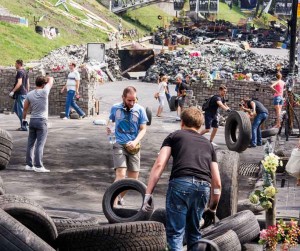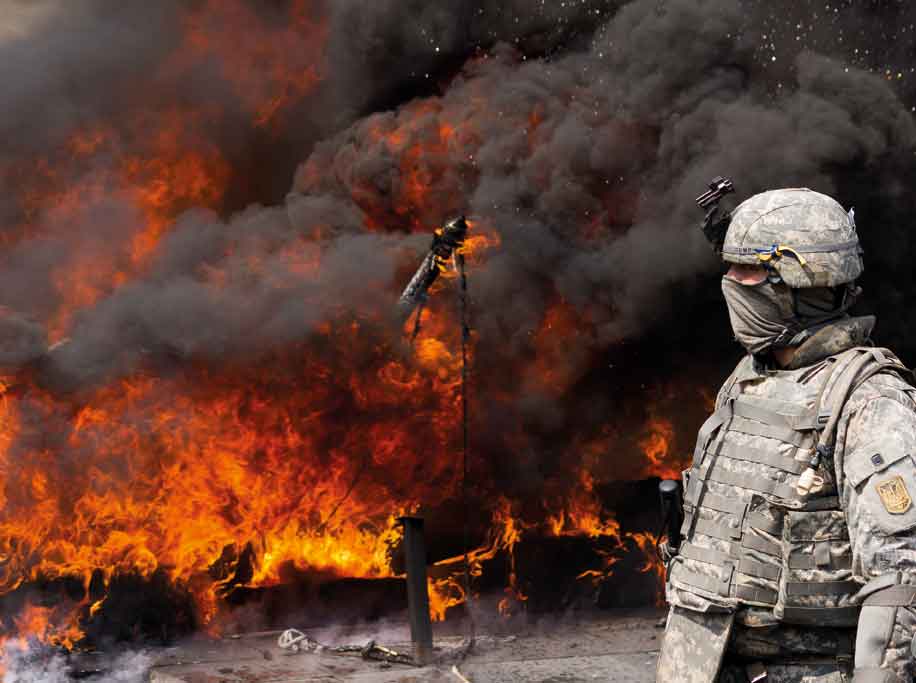Diplomas, passing grades, and places in educational programmes are examples of such things that money can buy in Ukraine. A degree certificate is worth a few thousand. This fact made the students take the revolution from the streets, into the universities.

In the Independence Square, Maidan, two young, masked demonstrators catch sight of their burning tent. They hurry to fetch a fire extinguisher. But it is too late – their tent is all in flames.
Witnesses in the square gossip about the fact that it was two regular Kiev residents who set the tent on fire when they were passing by – people who had supported the demonstrators earlier, but who have, now, grown weary of the fact that central Kiev resembles a war-zone. The demonstrators seem to have lost an important part of their popular support.
It is August, and to the joy of many Kiev residents, Maidan is about to be cleaned after almost eight months of demonstrations.
Further away from the burnt-down tent, 23 year-old Nina Golvskaya is standing. She is one of many participants in the demonstrations this past winter. She says that many Kiev residents think that the demonstrators that are left only comprise unemployed people, who have nothing better to do. Maidan has played out its role, though the demonstrations were not futile.
“I think we have changed a lot. First and foremost, ourselves. We will not go back to letting our government or our politicians do what they have done before,” Nina Golvskaya says.

Also on the scene in the winter was the student Julia Drozd, who was studying the last year of the Bachelor Programme in journalism when the demonstrations blazed up in November. She describes its beginnings as a peaceful demonstration with regular people. Old and young, and many students. Together, they went out, into the streets, and put their foot down against the former President, Viktor Janukovytj’s decision not to sign a cooperation agreement with the EU.
For Julia Drozd, it became a time-consuming puzzle to work as an assistant for international media during the days, and to demonstrate, in Maidan, in the evenings. Although she stayed in the square until the small hours many times, her studies went well.
“The demonstrations were a bit like my second job. I went there every evening, at the same time as I was working and studying in the daytime,” Julia Drozd says.
The support from professors who sympathised with the demonstrators made the whole thing much easier.
“They said that ‘if you miss lectures or seminars, it’s fine. It won’t have any consequences’,” Julia Drozd says.

In the night of 30 November, 2013, the peaceful demonstrators were met with violence from the government’s special force, Berkut.
Severe assault and battery, as well as many deaths, followed, and many of the victims were students. The incident made thousands of Ukrainian citizens join the revolution in Maidan.
The resistance to the widely spread corruption in the country grew stronger, and, a few months later, the President, Viktor Janukovytj, was deposed.
“The demonstrations changed us a lot. We became more realistic and, at the same time, optimistic. We witnessed people dying. We saw the police shoot people and brave surgeons perform surgery in the buildings around Maidan. Most likely, we grew up,” Julia Drozd says.
She believes that the revolution in Maidan has contributed to making students more active, and to younger people having become more aware of what it means to be a responsible citizen. Among other things, by not accepting corruption in everyday life.
The protests against corruption were not limited to only the state, but permeated the rest of society as well, and especially the universities.
In 2013, when the anti-corruption organisation Transparency International ranked 175 countries depending on how widely spread its corruption was, Ukraine was in the bottom – in 144th place, and thus, the worst in all of Europe.
Corruption at university level is partly due to the fact that employees at the universities have low salaries, and, as a consequence, many of them choose to make some extra money from students who want to receive higher grades, or a passing grade on an exam.
At Bogomolets National Medical University in Kiev, the problem of corruption became a big question. Anastasia Veresotskaya studies medicine there, and she saw how several protests broke out at the university. Thousands of students partook in demonstrations demanding that the Vice-Chancellor, as well as several professors, should leave because they had abused their positions of authority, and demanded money from students.
According to Anastasia Veresotskaya, oftentimes, professors deliberately failed students to make money.
“If I did not pass my exams on my own, I was forced to go to a professor, or to the Vice-Chancellor, and pay money,” she says.
The students’ protests resulted in a change of Vice-Chancellor. Now, it is also possible to retake courses, without having to pay bribes.
“We also succeeded in substituting some members of the teaching staff at the university. Not all of them, but some,” Anastasia Veresotskaya says.
Corruption is still a huge problem in Ukraine, but Julia Drozd believes that bribes at the universities have become rarer than before.
At the same time, she points out that the corruption oftentimes is double-sided. Just as the professor should not offer passing exam grades in exchange for money, students should not offer money in exchange for higher grades.
The students’ protests reached all the way up to the highest government level, and the Secretary of Education, Dmytro Tabachnyk, was deposed. Now, Julia Drozd is hoping that Ukraine’s new government will work towards a decrease of corruption in all levels of society, especially at the seats of learning.
“If the state does not solve the issue we have in the educational area, it will become a huge problem for the country in the future. Education is what drives this country forward,” Julia Drozd says.
Text and photo: Daniel Kindstrand
Translation: Richard Helander






